Ashgabat – A Disneyland
Days were always cloudy and cold during my stay in Ashgabat. Today was not exception. Every Sunday, some old stamp and coin collectors gathered in front of Lenin Statue to exchange and sell their collection. Most of them were senior Russians, from 40 years to 70 years of age.As anything else here, philatelic and numismatic hobbies in Turkmenistan also went to bizarre way. The post office didn’t sell stamps more than for postage purpose. The stamps were printed abroad in limited quota, sold to some government officials who would then distribute the stamps through their own channels. This made Turkmenistan stamps incredibly difficult to get in their own country. Sometimes it was even easier and cheaper to buy Turkmen stamps in Russia rather than in Ashgabat.
Mikail might be the youngest collector among those gray-haired old men in the park. He invited me to his house, some blocks north, to see his collection. “Life here is difficult, we don’t have money and work,” he grumbled. As a Russian, it was difficult to get proper job here. “If you don’t speak Turkmen, you cannot work. Everything should be written in Turkmen. I only know Cyrillic and it is still difficult for me to write Turkmen Latin. I live here for 40 years but still don’t speak the language.”
Mikail was typical of Russians elsewhere in Central Asia. Being Russian somehow prevented them to dilute with local majority. Was it due to their arrogance to learn language of ‘the lower nations’? Or was it due their inability to break the exclusivity wall between them and the people of the colony lands? In anyway, these Russians suffered a lot when some Central Asian countries, especially Turkmenistan, Uzbekistan and Kyrgyzstan, declared their nationalism-building programs. The programs included forcing all people to speak the national language in their works, thus refused the Russians who don’t speak local languages in fields of works.
For the case of Mikail, he had a Turkmen wife from Turkmenabat (Charjou), he worked in the bazaar, and Russians were now very small community after the independence of Turkmenistan, as most of them left the country immediately. His life couldn’t be separated from Turkmen breathe, but he just couldn’t speak the language. That’s all. And that was which made him suffering.
Before that era of ‘nationalism’ euphoria after the independence of the country, Mikail was specialist mechanic of marine boats. He mentioned Aral, Caspian, and a river south of Baikal as the places where he ever worked. Now he was reduced to a simple vegetable seller in the market. Some people might say the country’s policy was important in building nationalism among the newly-independent countries. Some might say they were racists. The poor Kyrgyzstan had to review their policies and forced to adopt Russian as second language in the new law reform as the Russian population, with average higher education and proficiency compared to the Kyrgyz, couldn’t get proper work to apply their ability. They were not accommodated in the country’s life. This caused backwardness in the country’s economy and stimulated many protests. Turkmenistan, in comparison, was still much richer, sitting on billion barrels of deposit of oil and enjoying their Golden Age. There was no big need to consider these half-unemployed Russian minority, the people who once colonized their land.
Having a wife from Turkmenabat also offered some other problems to Mikail, who live in Ashgabat. As in the communist era, there were still many laws to prevent people migration, even inside the country. His wife still couldn’t get Ashgabat citizenship that she couldn’t get any government work here. She was also now, a vegetable seller in the Russian market.
How much was the income for people with proper work? Mikail’s neighbor, an Amernian guy who worked as a policeman who was patrolling in front of the American embassy, earned about 120$ per month. Mikail said it was little, but not too bad. At least oil and gas is cheap here, and this was a key point of life in Turkmenistan.
“You know the price of a liter gasoline here? 300 Manat!”
300 Manat was about 120 Rupiah, about 1.40 US cent.
The Turkmenbashi regime really tried to share the oil wealth to the people, a way to make citizens content, while at the same time reducing the freedom of people in other sectors. While drinking tea and looking at the Turkmenistan ‘propaganda’ stamp collection, Mikail told me about luxurious cars buzzing Ashgabat roads, corrupt government officials, the US embassy attaché who earned 5000 dollars per month but bargained hard for 5 dollar stuff, about Turkmen citizen who had to pay 40$ now for visa to visit Russia, about the new Disneyland, and about his daughter who was going to have performance there, and about anything.
From Mikail’s house I went to Tolkuchka Bazaar, which was often refered as the biggest and liveliest bazaar in Central Asia. It was located 8 km outskirt of the capital, and Sunday, the bazaar day, always caused traffic jam of shared taxis and old buses from and to the villages.
Most parts of the bazaar were just like another bazaar things, selling products from woman bras to garment materials, from torchlight to broken old TVs from the 1970s. The most interesting part of the bazaar was the carpet bazaar, where beautiful Turkmen carpets (which made their way to their beautiful Turkmen national flag) were hung and spread over the dust of the desert, open air. The village women wore traditional costumes, a typical of desert dresses: colorful, heavy, full of accessories. Some men wore traditional telpek. I bought a tahia for myself which cost only 20000 Manat. Even in this bare desert, the Golden Age of Turkmenistan was still reflected from the golden teeth of the old men and women.
Mekan Ataliew was a telpek seller in the bazaar. He was so proud that his father was chosen as telpek maker to make special hats to be presented to the Indonesian president, Mr. Soeharto, when he visited Turkmenistan at that time. “Turkmenbashi presented Soeharto the telpek that my father made. I still keep the newspaper and magazine scrap about that,” proudly he told me.
I didn’t know that our Great Leader, Soeharto, made his picnic holiday to Turkmen deserts. But thanks to him, Mekan was very happy and insisted me as an Indonesian to receive a gift from a Turkmen citizen: a high quality hand-made black telpek, good for summer and winter time. Good quality telpek cap is not hot in summer. Maybe he also shared similar feeling, perasaan senasib seperjuangan, of living under dictatorship? For Mekan, it was out of questions. For him, Turkmenbashi was a very good leader and he expected Suharto to be the same. I didn’t want to ruin his family pride by telling him how Indonesians disliked Soeharto.
The bazaar started to go back to its desert nature at 3 pm, when sellers rolled back their carpets and prepared to go home. Some grumbled of not selling anything today, but most were happy. The highway to Ashgabat was crowded by buses, cars, horse charts, and shared taxis. Back to Ashgabat, again, the slogans of great leader (Turkmenbashi), great book of life (Ruhnama), the golden age (Altyn Asyry), Independence and Neutrality (Garashsyz we Bitaraplik), being pumped back again to your mind. I went back to the city center to visit one of the ex-president’s wonder: Turkmen Disneyland.
The project was held to commemorate the 15th anniversary of the independence. Many houses were demolished and people, who once lived in the area now the Disneyland stood, were forced to leave their houses without clear fate.
Now, the 15-year-old country had a Disneyland. It was kind of miniature of Jakarta’s Dunia Fantasi. The entrance ticket was 1000 Manat only, but foreigners had to pay 5$. I chose to admire it from out the fences. It was like collecting images of Indonesian face when seeing the Turkmen visitors queuing like troops of ants in front of a roller coaster, which was Turkmen version of Halilintar where Indonesian brothers had to queue for more than an hour before the ride. The other rides that I could see were Turkmen style of Indonesian Dunia Fantasi’s Niagara-gara, Ontang Anting, Si Kora-Kora, et cetera. I wondered whether Turkmenbashi ever had a wife whose dream was to build another park to collect the desert tribes, or a flower park to collect various cactuses and orchids from all corners of the country. Almost two decades ago, the Madam Suharto made ambitious and controversial projects of building Taman Mini Indonesia Indah (Beautiful Indonesian Mini Garden) and Taman Anggrek (Orchid Garden) which also left thousands homeless.
It was a Fantasy World. It was a Disneyland. One was in the middle of island in the middle of ocean. The other was in the middle of desert in the middle of nowhere. Both were fantasies, dream of being said wealth nations, and both sacrificed their own citizens.
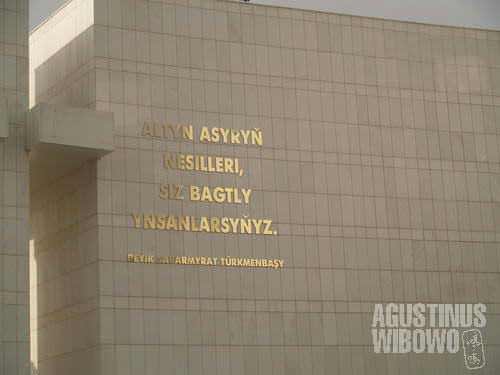
“The Golden Century generation, you are the lucky people!” says Turkmenbashi the Great Leader at the front gate of the Turkmen Disneyland
Returned to the park yesterday I attended the concert, there was another concert for today. This park name was Great Saparmyrat Turkmenbashi’s Golden Age Park. With the tahia I bought from the bazaar today, I slipped easily into the crowd of university students without attracting police attention. The weather this time was very windy. Strong, cold wind blew from all directions. The beautiful Turkmen flags wave proudly, but the students who had to hold the flags grumbled for their unlucky fate. They had to look good on the TV though, so they kept the smiles. It was bad luck for the students who were chosen to sit at the front seats, as they would be shot by the cameramen all the time. They had to keep their good manners, smile properly, cheer in order, while a row of girls with flowers had to wave the little flowers to follow the melody of the music praising Ruhnama, Turkmen leader, and the Golden Age. All of the directed behavior of the concert, even for the spectators, reminded me to any TV programs of Chinese Central Television (I once attended a CCTV-4 program). Everything had to follow central directions. From the details of clothes, applause, smiles, waving hands, presenting flowers, cheering, anything, anything, had its direction in the book.
The great leader was visible everywhere. The stage had a big poster of Mr Saparmyrat sitting with his left hand supporting his head, smiling, as he was enjoying those dancing, singing, and all praises to his greatness. The students, like the North Koreans, also had to wear badges of President’s head on their suit. It was luckier for the students who didn’t have to sit at the front seats, as they just needed to be present, to make the atmosphere lively. They chatted in groups, just like it was a school reunion program. Nobody cared about the show on the stage. Right after the announcement that the show was finished, these students were the first group who vanished from the spot. They couldn’t leave any earlier as the police were there to patrol the escaping students.
When I returned back to my home stay, the house owner just finished renovating his house. This Shiite man was proud. But he was also full of worry. Some houses were forced to vanish because of the Disneyland project. He was afraid that the fate would come on his head.
“Does your country have a dictator? Do people have to move when the government wants them to?” asked him to me, looking for a friend-in-struggle.
Life was not as fun as the Disney Land. It was a fantasy world full of sacrifices.

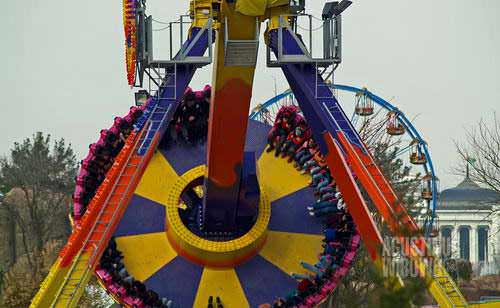
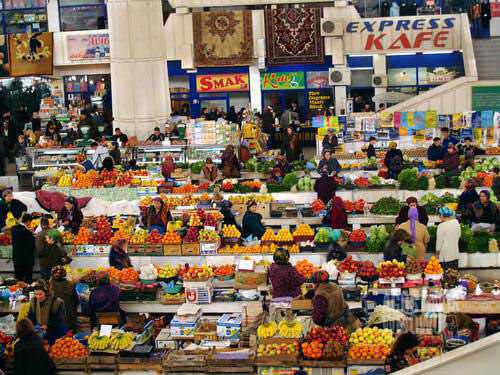
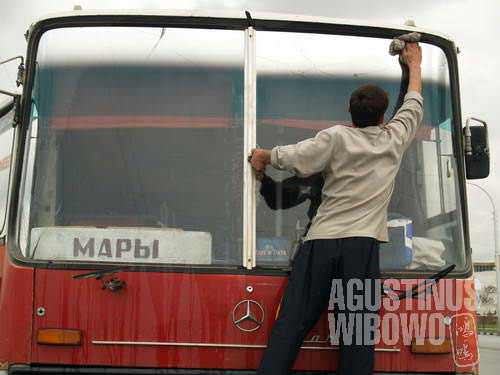
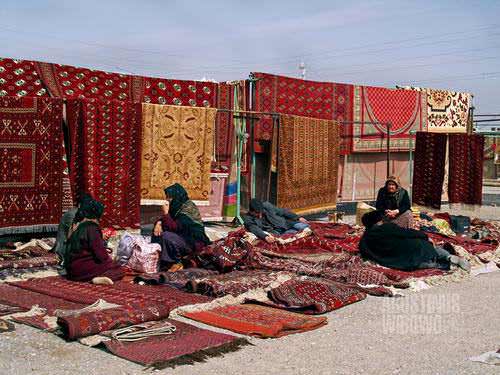
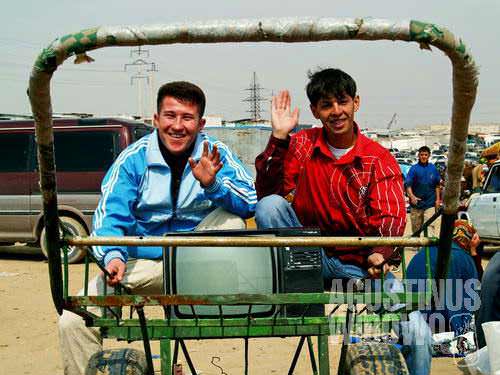
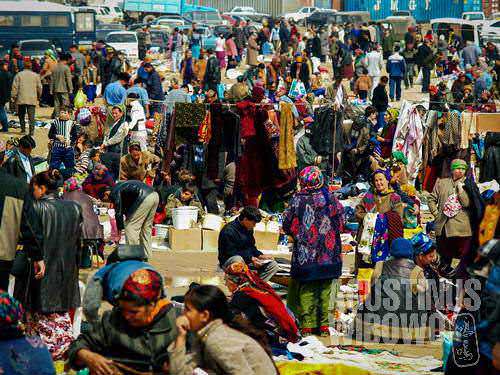
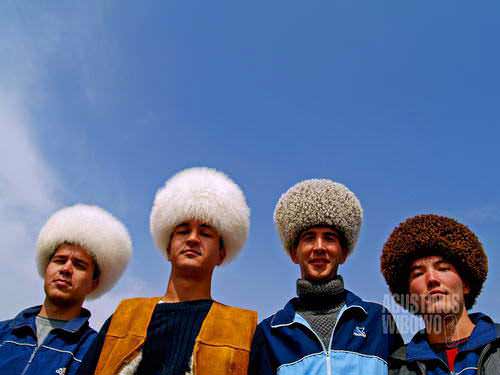
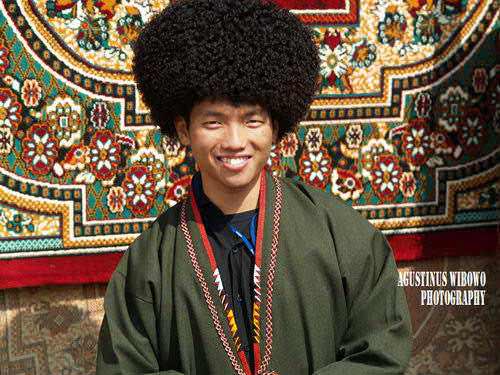
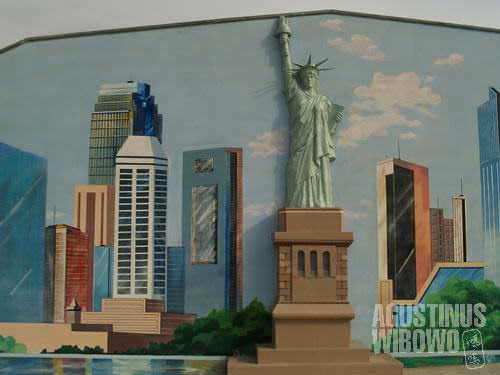
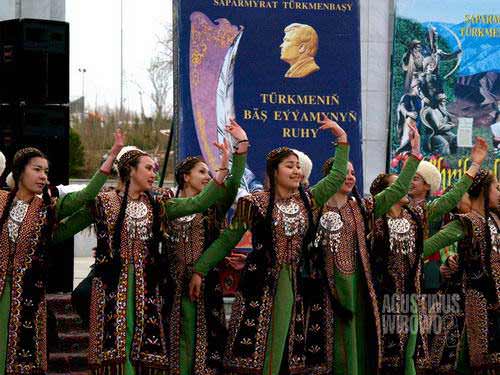





Love this story 🙂
Kayaknya Harga bensin termurah di dunia ya di Turkmenistan Rp 120 / liter hehehehe ngalahin harga BBM di Venezuela nih
Sincerely,
Maria K. Asten
Price list harga BBM beberapa negara di dunia
Berikut terlampir Price List BBM di beberapa Negara di
dunia, harga tersebut adalah setelah kenaikan dan
sudah perhitungkan dalam IDR/liter:
* Amsterdam-Belanda : Rp. 17.564
* Oslo-Norwegia : Rp. 16.995
* Milan-Italia : Rp. 16.155
* Kopenhagen-Denmark : Rp. 16.073
* Brussels-Belgia : Rp. 16.019
* Stockholm-Swedia : Rp. 15.721
* London-Inggris : Rp. 15.694
* Frankfurt-Jerman : Rp. 15.098
* Paris-Perancis : Rp. 15.016
* Lisbon-Portugal : Rp. 14.501
* Budapes-Hungaria : Rp. 13.390
* Dublin-Irlandia : Rp. 12.956
* Geneva-Swiss : Rp. 12.848
* Madrid -Spanyol : Rp. 12.333
* Tokyo-Jepang : Rp. 11.493
* Praha-Ceko : Rp. 11.620
* Bukares-Romania : Rp. 11.086
* Brasilia-Brasil : Rp. 8.457
* Havana-Kuba : Rp. 8.213
* Taipei-Taiwan : Rp. 7.698
* Johannesburg-Afsel : Rp. 7.101
* USA : Rp. 7.047
* Panama City-Panama : Rp 5.936
* Moscow-Rusia : Rp. 5.692
* San Juan-Puerto Rico : Rp. 4.716
* Riyadh-Arab : Rp. 2.467
* Kuwait : Rp. 2.114
* Kairo-Mesir : Rp. 1.762
* Lagos-Nigeria : Rp. 1.030
* Caracas-Venezuela : Rp. 325 —> pindah ke sana nyok!!! :):)
Dari daftar tersebut di atas diketahui bahwa kenaikan
BBM tidak hanya terjadi di tanah air, seluruh duniapun mengalami hal ini, termasuk beberapa Negara Adidaya seperti Amerika Serikat. Dari data yang dikutip dari CNN, harga BBM di Amsterdam termasuk yang paling mahal di dunia dengan harga setara dengan Rp. 17.564/liter, sementara yang paling murah adalah di Caracas-Venezuela yaitu setara dengan Rp. 325/liter.
antik-cantik ya para penari itu?
Bajunya juga ga kalah menarik. Bgs bgt.